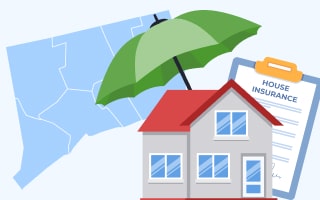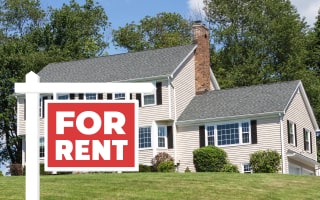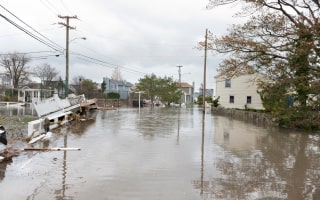Homeowners Insurance in Connecticut

Connecticut is located in the northeast, also known as New England. This part of the county is prone to hurricanes and harsh winter storms. Although New Englanders don't have to worry too much about tornadoes, tsunamis, and wildfires, ice and snowstorms cause much damage with whipping winds, hail, and wet, heavy snow. Since 1953, Connecticut has seen 31 federally declared disasters, and the rate of disasters per 1 million people is 8.55.
Due to the extremely cold temperatures in New England, residents must also deal with frozen pipes, damage from ice dams, and roof damage from heavy snow. Wind damage can also cause tree branches to fall, hitting and damaging the house. New England can also experience high winds damaging shingles and roof tiles.
Although states don't require homeowners insurance, experts strongly recommend it for all homeowners. If you finance your home, your lender will require that you purchase enough homeowners insurance to protect their investment and your home. You must keep the insurance policy active for the life of the loan. Lenders will dictate the levels of coverage you need.
The average rate for homeowners insurance is based on coverage levels. For $300,000 worth of coverage, the average rate in Connecticut is $2,231/year, slightly less than the national average of $2,270/year.
Types of Homeowner Insurance Coverage Available in Connecticut
Every state and insurance provider offers different kinds of coverage depending on the weather conditions and risk potential of other perils. In Connecticut, the risk is all about wind, ice, and snow damage. Most areas of New England are relatively safe, with low crime rates. The types of homeowners insurance available in Connecticut are:
-
Dwelling Coverage: Dwelling coverage repairs or replaces the structure of your home, including the walls, roof, foundation, windows, doors, etc.
-
Other Structures: Other structures coverage pays to repair or replace detached items like garages, fences, pools, and sheds.
-
Personal Property: Personal property coverage pays to replace your belongings if damaged, destroyed, or stolen. Some examples are clothing, furniture, and electronics.
-
Liability: If someone gets hurt on your property due to your negligence and sues you in court, this insurance pays your legal bills.
-
Guest Medical: This coverage will pay their medical bills after someone is injured on your property.
-
Additional Living Expenses (ALE): If you are forced to vacate your home while it is repaired, this insurance will pay for your expenses (hotel, laundry, food, etc.).
Although floods are rare, homeowners do have the option of buying part of their home in Connecticut.
FEMA (Federal Emergency Management Agency) manages the National Flood Insurance Program (NFIP) through a network of 50 providers across the U.S.
Flood insurance can repair damage and replace items after a flood. It can cover the building and/or your personal belongings, depending on your options. This program is available to homeowners, renters, and businesses. Learn more about the program on FEMA's website.
Home Insurance and Natural Disasters
Frequent natural disasters are wreaking havoc on the homeowners insurance industry. Experts estimate that 39 million homes (1/4 of homes in the U.S.) are undervalued and cannot be rebuilt in the event of a disaster. In the last five years alone, home insurance prices have skyrocketed, increasing by an average of 34% across the board. Some areas saw an increase of 60%, and providers are pulling out of high-risk states, leaving very few options for homeowners. From 2018 to 2023, Connecticut homeowners insurance rates went up 23.4%.
Connecticut experiences many harsh winter storms, some hurricanes, very few tornadoes, and some wildfires. In 2022, Connecticut had only two tornadoes but 150 wildfires, destroying 347 acres.
How Can I Save on Homeowner Insurance Premiums in Connecticut?
Many things affect your personal insurance rates. The most impactful factors are location, where you live, weather conditions, and potential perils. Even if you never see these disasters, it's all about "perceived risk", and if the insurance company thinks you might be in a dangerous part of the country, your rates will be higher. Other elements that factor into your rates are:
-
Age and Size: Your home's age and size also impact your rates. The larger and older the house, the more expensive it will be to replace it.
-
Materials: If your home is constructed with high-quality materials and expensive finishes, your premiums will be higher because it costs more to replace them.
-
Coverage and Deductible: The more coverage you choose, the higher your rates will be. The higher your deductible, the lower your rates.
-
Credit History: People with good credit earn better rates because they are seen as having less risk. If you have credit issues, your rates will be higher.
-
Claims History: Your insurance will increase if you have submitted previous claims. The more claims, the higher the rates. You will be seen as high-risk.
-
Pets & Attractive Nuisances: Your rates will be higher if you have certain breeds of dogs (prone to attacking humans) or dangerous pools and trampolines.
If you live in Connecticut, you should see average insurance rates, but you can always find ways to save. Some tips for saving on your homeowners insurance rates are:
- Avoid installing a pool, trampoline, or other attractive nuisances.
- Keep your credit score high and pay all your bills on time.
- Bundle your insurance policies together.
- Install safety items like smoke alarms, fire extinguishers, etc.
- Install a security system.
- Increase your deductible.
- Stop and think before submitting a claim.
- Ask your insurer about other discounts (veterans, military, senior).
Home Insurance Discounts in Connecticut
Home insurance is a policy that covers your home in the event of a disaster. It pays to repair or replace your home after a qualifying event. Depending on the coverage, they will also replace your personal belongings, pay someone's medical expenses if they get hurt on your property, pay your legal bills if that person sues you, and pay ALE expenses if you must leave while repairs are made. There are two main types of policies: actual cash value (which factors in depreciation) and replacement value. Be careful; cash value may not be enough to rebuild your home after a qualifying event.
You can get a policy in various ways, including by phone, through online quotes and applications, or by visiting a local agent. Working with an agent can help determine how much coverage you need. You can even use online calculators to find out how much you need and get a cost estimate. Once you find a carrier and choose your coverage, you must pay the first year in full in advance. After that, you can pay monthly through your mortgage escrow or once a year by paying it in full.
Most carriers offer discounts to homeowners. Some discounts you might be able to use to cut the cost of your premiums are:
- Loyalty Discounts: When you remain a loyal customer for a long time, your carrier may give you extra discounts. The more time you have been with them, the bigger the discount.
- Senior Discounts: Some providers offer discounts for seniors with a clean claims history.
- Vet or Military Discounts: Veterans and military personnel often get discounts for their service.
- Bundle Discounts: If you bundle multiple policies with the same insurer, they will offer you better prices.
- Claims-Free Discounts: If you go a certain amount of time without any claims, your provider may offer you better rates.
- Green Discounts: You could be eligible for additional discounts if you install eco-friendly appliances and other upgrades.
Some insurance providers also offer lower rates for non-smokers if you install safety features or security systems.
Common Rates Offer by Homeowners Insurance Firms
New construction homes cost less to rebuild and use more efficient, modern materials that comply with local safety codes. Therefore, insurance rates for new homes are lower than for older homes. Other factors, like your credit score, claims history, and other things, also affect rates, even for new homes.
The average cost for new home insurance is about $80/month. In Connecticut, it is an average of $130.91/month.
Top Ten Insurance Firms in Connecticut and Average New Home Savings
| Company | % savings |
|---|---|
| Nationwide | 76% |
| State Farm | 51% |
| Erie Insurance | 51% |
| Travelers | 63% |
| Chubb | N/A |
| USAA | 54% |
| Amica | N/A |
| Allstate | 47% |
| Lemonade | N/A |
| Liberty Mutual | N/A |
Home Insurance and Renovations in Connecticut

Home renovations and upgrades can refresh your old home and make it new again. Some renovations increase risk or value and raise your premiums, whereas others improve your home's durability or safety and reduce your rates. Some have a dual effect and cancel each other out.
![]() Home Renovations That Increase Insurance Premiums
Home Renovations That Increase Insurance Premiums
Some home renovations that increase your insurance rates are:
- Hot Tubs/Swimming Pools: Although fun, these things are considered "attractive nuisances" that add risk and increase your rates.
- Adding Square Footage: Whenever you build an addition and add square footage, it means the house will cost more to rebuild after a disaster; therefore, your rates will go up.
- Upgrade Kitchen/Bath: Upgrading your kitchen and bath could increase the value by 50%, but it also means higher insurance rates.
![]() Home Renovations That Lower Insurance Premiums
Home Renovations That Lower Insurance Premiums
Some home renovations that lower insurance rates are:
- Replacing Your Roof: Installing a new roof using more robust, resilient materials could reduce insurance rates.
- Adding Security & Safety: Adding a security system or safety features like a sprinkler system could shave dollars off your annual premiums.
- Add Hurricane Shutters: Connecticut does see its share of hurricanes. Adding hurricane shutters could earn you a discount on your rates.
Installing solar panels may help you save on electricity and make your home more efficient, but they will also be more expensive to replace. Your insurance may go up or down after installing solar energy equipment.
Home insurance pays to repair or rebuild after a qualifying event but does not pay for regular maintenance or upgrades, such as a new roof, foundation repairs, siding, or new windows and doors. If an accident causes destruction while you are working on your house, your policy may pay for repairs then.
It's imperative to speak with your insurance agent before beginning any renovations to find out how they will impact your insurance. Renovations can dramatically change your coverage and rates.
Connecticut Renters' Insurance

Renters insurance is a type of insurance expressly created for people who rent homes, apartments, and condos. Unlike homeowners insurance, it does not cover dwellings (that will be included in the owner's policy). It does cover personal belongings, liability, and additional living expenses. Typically, it covers theft if your personal items get stolen. However, there are limits, and it may not cover expensive items like coin collections and jewelry.
The good news is that renters insurance is usually much cheaper than homeowners insurance. The things that affect the price of renters insurance are your location (dangerous areas are more expensive), the coverage limits you choose (the more coverage, the higher the cost), and the number of units in your building (the more units, the lower the price).
Renters insurance can cost as little as $10/month. In Connecticut, renters pay an average of $14/month or $170/year. People living in urban areas will pay more due to higher crime, and suburban renters will pay less.
Condo Insurance in Connecticut

Condo owners need insurance just as much as homeowners, but it differs slightly. Condo associations have a master policy that covers the dwellings, plumbing, septic, roofs, and other common areas. Each individual condo owner must have their own insurance to pick up where the master policy leaves off. Depending on the specifics of that policy, your condo insurance HO-6 will cover your unit's interior and restore it to its former condition. These policies are often referred to as "walls-in". Most condo owners have at one time or another, upgraded their units with more modern fixtures, flooring, etc. This insurance ensures that the condo will be restored to how it was before the disaster.
Although renters insurance does not include any dwelling coverage, condo insurance does, but it is limited to whatever the master policy does not cover. For example, if a fire destroys the roof and must be replaced, that would be covered by the master policy, not the condo insurance. Anything damaged inside the condo would be covered by condo insurance.
Condo insurance covers partial dwelling, personal liability, personal injury payments (if the person is hurt inside the condo), loss of use, and loss assessment.
Some things that are covered under condo insurance include:
- Appliances
- Flooring
- Interior Walls
- Wiring
- Plumbing
- Countertops and Cabinets
- Light Fixtures
- Furniture
- Personal Possessions
The average cost of condo insurance in Connecticut is $52/month or $626/year with a $1,000 deductible, $60,000 in personal property coverage, and $300,000 in liability coverage.
With inflation rising, everyone is looking to decrease expenses. Some ways to reduce your condo insurance cost are:
- Raise Your Deductible
- Install Security or Safety Upgrades
- Opt-in for Auto Withdraw Payments
- Bundle Your Insurances
- Avoid Small Claims
- Ask for Discounts
- Keep Your Credit Score High
- Lower Your Risk
Connecticut Home Insurance Market
Across the country, most homeowners insurance carriers were unprofitable. However, in Connecticut, due to the lower risk, the majority of providers have been profitable, but those profits have decreased. The insurance industry as a whole is in danger with increased disasters, violent weather, and abundant claims. Insurers struggle to maintain profits and remain competitive. In some higher-risk areas, carriers are pulling out and not offering coverage.
Although Connecticut is prone to hurricanes and turbulent winter storms, the claims have not been excessive enough to bankrupt insurance providers in the state. If this pattern holds, residents should be able to obtain and keep home insurance.
Insurance providers are subject to laws and ethical rules of conduct. There is no federal agency in charge of monitoring and regulating these businesses. Instead, they are managed at the state level, where one agency monitors their business practices, investigates customer complaints, and sanctions violating insurers. In Connecticut, that agency is the Department of Insurance, with an address of P.O. Box 816, Hartford, CT 06142.
Homeowners Insurance Guide
- Homeowners Insurance in Connecticut
- Types of Homeowner Insurance Coverage Available in Connecticut
- Home Insurance and Natural Disasters
- How Can I Save on Homeowner Insurance Premiums in Connecticut?
- Home Insurance Discounts in Connecticut
- Home Insurance and Renovations in Connecticut
- Connecticut Renters' Insurance
- Condo Insurance in Connecticut
- Connecticut Home Insurance Market
Instant Access to Connecticut Property Records
- Owner(s)
- Deed Records
- Loans & Liens
- Values
- Taxes
- Building Permits
- Purchase History
- Property Details
- And More!
Homeowners Insurance Guide
- Homeowners Insurance in Connecticut
- Types of Homeowner Insurance Coverage Available in Connecticut
- Home Insurance and Natural Disasters
- How Can I Save on Homeowner Insurance Premiums in Connecticut?
- Home Insurance Discounts in Connecticut
- Home Insurance and Renovations in Connecticut
- Connecticut Renters' Insurance
- Condo Insurance in Connecticut
- Connecticut Home Insurance Market